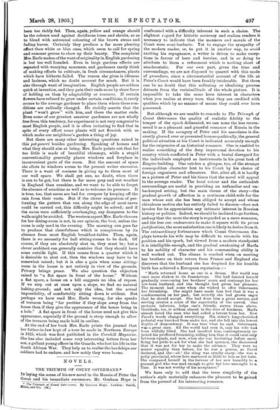NOVELS.
THE TRIUMPH OF COUNT OSTERMANN.'
Is laying the scene of his new novel in the Russia of Peter the Great and his immediate successors, Mr. Graham Hope is
• The Triumph of Count Ostermann. By Graham Hope. London : Smith, Elder, and Co. Oa.]
confronted with a difficulty inherent in such a choice. The slightest regard for historic accuracy and realism renders it necessary to indicate that the manners and morals of the Court were semi-barbaric. Yet to engage the sympathy of the modern reader, or, to put it in another way, to avoid exciting his repugnance, a writer is driven to make excep- tions in favour of hero and heroine, and in so doing to attribute to them a refinement which is nothing short of anachronistic. For our own part, given the time and surroundings, we are not disposed to quarrel with this mode of procedure, since a circumstantial account of the life at Peter's Court would have been frankly intolerable. But there can be no doubt that this softening or idealising process detracts from the verisimilitude of the whole picture. It is impossible to take the same keen interest in characters when you realise at every turn that they are credited with qualities which by no manner of means they could ever have possessed.
But although we are unable to concede to The Triumph of Count Ostermann the quality of realistic fidelity to the temper of the epoch delineated, we can none the less recom-
mend it as a pleasant and graceful romance of Russia in the making. If the savagery of Peter and his associates is dis- creetly glossed over or presented homoeopathically, the general political situation at his Court is indicated accurately enough for the exigencies of an historical romance. One is enabled to realise something of the deep impersonal devotion to his country which conflicted in Peter with a brutal disregard for the individuals employed as instruments in his great task of Empire-building. One catches a glimpse, too, of the strange cosmopolitan character lent to his Court by his choice of foreign organisers and educators. But, after all, it is hardly as a picture of Peter and his times that the novel will appeal to the average reader. The local colour and the outlandish surroundings are useful in providing an unfamiliar and un- hackneyed setting, but the main theme of the story—the gradual growth of affection in a mutinous child-wife for the man whose suit she has been obliged to accept and whose chivalrous motive she has entirely failed to discern—does not involve for its appreciation any intimate interest in Russian history or politics. Indeed, we should be inclined to go further, and say that the more the story is regarded as a mere romance,
and the less one endeavours to make it square with its pieces justifzeatives, the more satisfaction one is likely to derive from it.
The extraordinary forbearance which Count Ostermann dis- plays towards his wife may be difficult to reconcile with his position and his epoch, but viewed from a modern standpoint it is intelligible enough, and the gradual awakening of Marfa to his nobility of character and his commanding ability is well worked out. The climax is reached when on meeting her brothers on their return from France and England she discovers that the husband she has despised for his humble birth has achieved a European reputation :-
" Marfa returned home as one in a dream. Her world was once more shaken to its foundations. She had fancied herself
gradually overcoming her brothers' scorn and contempt for her low-born husband, and the thought had given her pleasure. The moment had come when she wished to offer Ostermann
her friendship. She might have made him feel that it was a condescension on her part; but secretly she had grown eager that he should accept. She had done him a great service, and serving creates a sense of the superiority of the served. One protects inferiors, helps one's friends, serves those above. Gratitude, too, is seldom absent in the doer of kindness. Marfa almost loved the man who had asked a favour from her. Now Pavel's words changed everything. His sister's long-cherished pedestal was knocked from under her, and she fell into the lowest depths of despondency. It was true what he said. Ostermann was a great man. All the world had seen it, only his wife had been wilfully blind. She had insulted him, contemptuously re- jected his proffered friendship, telling him that it could exist only between equals, and now, when she was hesitating before sacri- ficing her pride to ask for what she had spurned, she discovered that it was not for her to make the advance. They were no nearer equality than before, for he was a genius, as Pavel declared, and she—ah the sting was cruelly sharp—she was a, petty provincial, whose love mattered as little to him as her hate. She compared herself in the fervour of her new humility to a peasant girl who was mad enough to give her love unsought to a. Tzar. It was not worthy of his acceptance."
We have only to add that the terse simplicity of the
author's style materially enhances the pleasure to be gained from the perusal of his interesting romance.










































 Previous page
Previous page